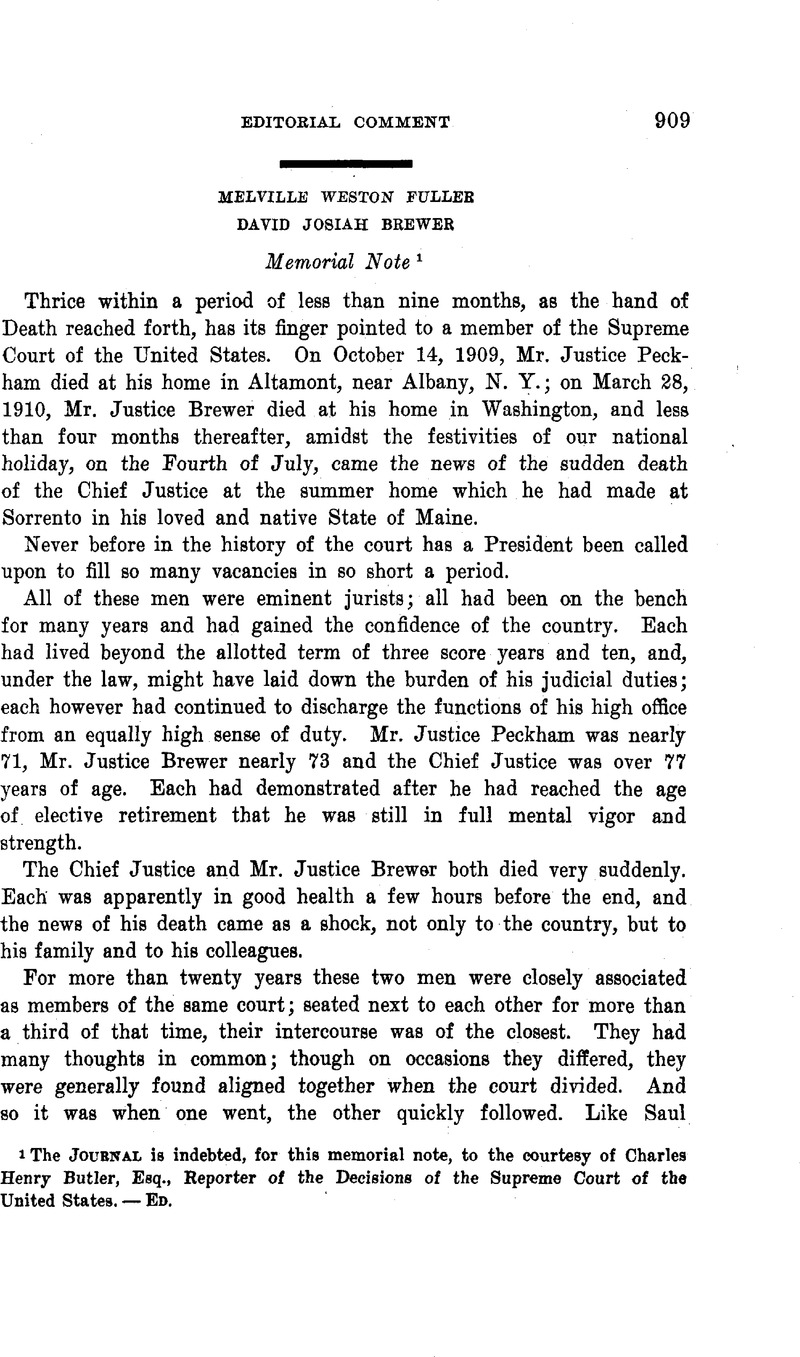No CrossRef data available.
Published online by Cambridge University Press: 04 May 2017

1 The JOURNAL is indebted, for this memorial note, to the courtesy of Charles Henry Butler, Esq., Reporter of the Decisions of the Supreme Court of the United States. — ED.
2 MELVILLE WESTON FULLER, Chief Justice of the United States, was born in Augusta, Me., February 11, 1833; was graduated from Bowdoin College in 1853; studied law, attended a course of lectures at Harvard Law School, and was admitted to the bar in 1855; formed a law partnership in Augusta, Me., and was an associate editor of a Democratic paper called The Age; in 1856 became president of the common council, and served as city solicitor; removed to Chicago, I11., in 1856, where he practiced law until appointed Chief Justice; in 1862 was a member of the State constitutional convention; was a member of the State legislature from 1863 to 1865; was a delegate to the Democratic national conventions of 1864, 1872, 1876, and 1880; the degree of LL. D. was conferred upon him by the Northwestern University and by Bowdoin College in 1888, by Harvard in 1890, by Yale and Dartmouth in 1901; was appointed Chief Justice April 30, 1888, confirmed July 20, 1888, and took the oath of office October 8, same year. He was chancellor of Smithsonian Institution; chairman trustees Peabody Education Fund; vice-president John F. Slater Fund; member board of trustees of Bowdoin College; one of the arbitrators to settle boundary line between Venezuela and British Guiana, Paris, 1899; member permanent court of arbitration, The Hague; member arbitral tribunal in the matter of the Muscat Downs, The Hague, 1905; received thanks of Congress December 20, 1889.
DAVID JOSIAH BBEWER, Associate Justice of the United States Supreme Court, was born in Smyrna, Asia Minor, June 20, 1837; was the son of Rev. Josiah Brewer and Emilia A. Field, sister of David Dudley, Cyrus W., and Justice Stephen J. Field; his father was an early missionary to Turkey; was graduated from Yale College in 1856 and from the Albany Law School in 1858; established himself in his profession at Leavenworth, Kan., in 1859, where he resided until he removed to Washington to enter upon his duties; in 1861 was appointed United States commissioner; during 1863 and 1864 was judge of the probate and criminal courts of Leavenworth county; from January, 1865, to January, 1869, was judge of the first district court of Kansas; in 1869 and 1870 was county attorney of Leavenworth; in 1870 was elected a justice of the Supreme Court of his State, and re-elected in 1876 and 1882; in 1884 was appointed judge of the Circuit Court of the United States for the eighth district; was appointed to the Supreme Court, to succeed Justice Stanley Matthews, deceased, in December, 1889, and was commissioned December 18, 1889; president of the Venezuelan Boundary Commission, appointed by President Cleveland; member of Arbitration Tribunal to settle boundary between British Guiana and Venezuela; orator at bicentennial, Yale University, 1901; president International Congress of Lawyers and Jurists, St. Louis, 1904; received degree of LL. D. from Iowa College, Washburn College, Yale University, State University of Wisconsin, Wesleyan University, Middletown, Conn.; University of Vermont, and Bowdoin College.
3 At the meeting of the bar and officers of the Supreme Court of the United States in memory of Mr. Justice Brewer, held on April 30, 1910, Mr. George Grafton Wilson, a member of the American Society of International Law, made the following remarks and placed upon the record the resolution therein referred to which had been adopted by the Society.
“The American Society of International Law has been in session in Washington since Thursday of this week. During this period we have missed very keenly the genial and inspiring presence of our distinguished vice-president, Justice Brewer. When it was learned that you would gather here this noon to pay tribute to his memory, the Society adjourned to join with you in that tribute. We recognize his distinguished service to a branch of law somewhat different from those branches which have already been particularly mentioned — to International Law, which has gained greatly in importance during the period which Justice Brewer has served in this great court. Since 1890 cases have become more and more frequent, involving such legal principles as those in which we are specially interested. The Society, particularly regardful of his services to international justice, adopted the following resolution:
“The American Society of International Law desires to record, with profound aense of loss, the death of Hon. David J. Brewer, since 1889 a justice of the Supreme Court of the United States, in 1896 president of the Venezuela Boundary Commission, in 1899 a member of the Venezuela Arbitration Tribunal, from its foundation a vice-president and loyal supporter of the American Society of International Law.”
4 There has been no meeting of the Society or of the Executive Council since the death of Chief Justice Fuller.
5 For an interesting review of some of the decisions of Mr. Justice Brewer, see the remarks of the Attorney-General presenting resolutions on his death to the Supreme Court of the United States on May 31, 1910, and which will appear in Volume 218, United States Reports.
6 Mr. Justice Brewer in Kansas v. Colorado, 206 U. S. 46, p. 97, citing Chief Justice Fuller in an earlier decision in the same case 185 U. S. 125, p. 146.
7 Printed in JOURNAL, 1:215.
8 Printed in JOURNAL, 1:204.
9 Printed in JOURNAL, 1:202.